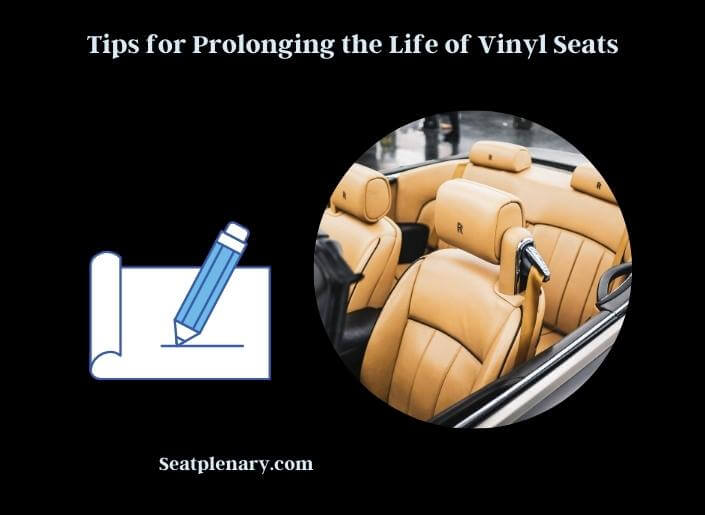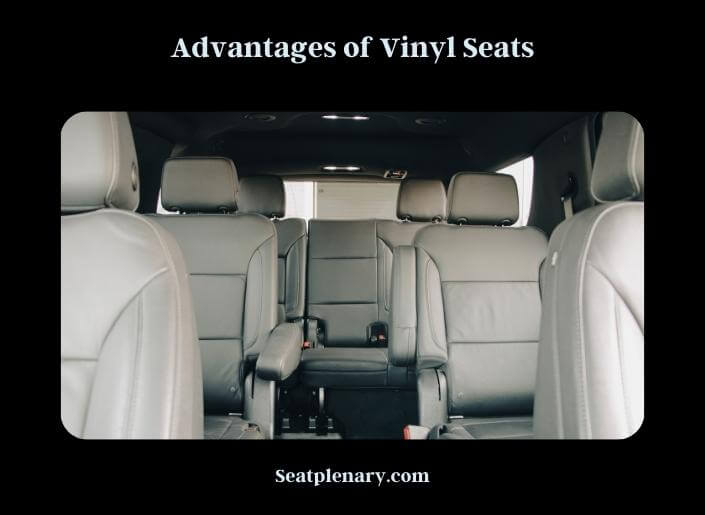Vinyl seats have become a popular choice for many industries due to their durability, versatility, and aesthetic appeal. These seats are made of a synthetic material known as polyvinyl chloride (PVC) and are commonly used in the automotive, furniture, healthcare, hospitality, marine, and aviation industries.

The history of vinyl seats dates back to the 1920s when vinyl was first introduced as a substitute for leather. It was used as a cheaper and more durable alternative for upholstery in the automotive industry. Since then, vinyl has been widely used and has become a staple in many industries due to its unique properties.
In modern times, vinyl seats have become an essential component of many products due to their cost-effectiveness, easy maintenance, and versatile design options. Whether you’re looking for seats for your car, furniture, or boat, vinyl seats provide an affordable and reliable option that can withstand harsh weather conditions and daily wear and tear.
Common Applications of Vinyl Seats
Vinyl seats are used in a wide variety of industries due to their durability, ease of maintenance, and versatility.
Automotive Industry
Vinyl seats are commonly used in cars, trucks, and other vehicles. They are a popular choice for automotive upholstery because of their durability, resistance to stains, and easy maintenance. Vinyl seats come in a variety of colors and patterns, making them a versatile option for car interiors.
Furniture Industry
Vinyl seats are often used in the furniture industry to create durable and stylish pieces. They are commonly found in office chairs, sofas, and recliners. Vinyl seats are an excellent choice for furniture because they are easy to clean and can withstand heavy use.
Healthcare and Hospitality Industry
Vinyl seats are a popular choice for healthcare and hospitality settings due to their easy maintenance and durability. They are commonly found in waiting room chairs, hospital beds, and examination tables. Vinyl seats can be easily disinfected, making them an ideal choice for environments that require high levels of cleanliness.
Marine and Aviation Industry
Vinyl seats are commonly used in boats and airplanes due to their resistance to water and harsh weather conditions. They are also lightweight and easy to maintain, making them an ideal choice for these industries.
Care and Maintenance of Vinyl Seats
Vinyl seats are a popular choice for many industries due to their durability and ease of maintenance. Here are some tips for caring for and maintaining your vinyl seats:
Cleaning Vinyl Seats
To clean vinyl seats, start by wiping them down with a damp cloth to remove any loose dirt or debris. For stubborn stains, use a mild soap solution and a soft-bristled brush to gently scrub the affected area. Be sure to rinse the seats thoroughly with water and dry them with a clean towel.
Protecting Vinyl Seats
To prevent damage to your vinyl seats, avoid exposing them to direct sunlight or extreme temperatures. UV rays can cause vinyl to fade and crack, while extreme heat or cold can cause the material to expand or contract. Use a protective spray or conditioner to help prevent fading and cracking.
Repairing Vinyl Seats
If your vinyl seats become damaged, such as with a tear or puncture, it’s important to repair them as soon as possible to prevent further damage. You can purchase vinyl repair kits at many home improvement stores or online. Follow the instructions carefully and use a patch or filler to repair the damaged area.
Tips for Prolonging the Life of Vinyl Seats
To prolong the life of your vinyl seats, avoid using harsh cleaning chemicals or abrasive materials. Instead, use a soft-bristled brush and a mild soap solution. Also, be sure to wipe up spills and stains as soon as possible to prevent them from setting in.

Avoid Harsh Chemicals
Avoid using harsh chemicals or cleaners, such as bleach or ammonia, on your vinyl seats. These chemicals can damage the material and cause it to fade or crack over time. Instead, use a mild soap solution and a soft-bristled brush to gently clean your vinyl seats.
Store Vinyl Seats Properly
If you need to store your vinyl seats for an extended period, be sure to store them in a cool, dry place out of direct sunlight. Cover them with a protective cover to prevent dust and debris from settling on the material.
Use Caution with Sharp Objects
Vinyl seats can be punctured or torn by sharp objects, such as scissors or knives. Be careful when using sharp objects around your vinyl seats to prevent accidental damage.
Avoid Excessive Scrubbing
While it’s important to clean your vinyl seats regularly, excessive scrubbing can damage the material. Use a soft-bristled brush and a gentle, circular motion to clean your vinyl seats without causing damage.
Address Mold or Mildew Immediately
If you notice mold or mildew growing on your vinyl seats, it’s important to address it immediately. Use a mild soap solution and a soft-bristled brush to remove the mold or mildew, and then dry the seats thoroughly. If the problem persists, consider seeking professional help to address the issue.
Tips for Prolonging the Life of Vinyl Seats
Vinyl seats are known for their durability and resistance to wear and tear. With proper care and maintenance, you can extend the lifespan of your vinyl seats even further. Here are some tips for prolonging the life of your vinyl seats:
| Clean Regularly | One of the most important things you can do to prolong the life of your vinyl seats is to clean them regularly. Dirt, dust, and other debris can build up on the surface of the seats, leading to scratches, stains, and other forms of damage. Use a soft-bristled brush and a mild soap solution to gently clean your vinyl seats on a regular basis. |
| Avoid Exposure to Extreme Temperatures | Vinyl seats are sensitive to temperature changes and can become damaged if exposed to extreme heat or cold. Try to keep your vinyl seats away from direct sunlight, as UV rays can cause the material to fade and crack. If you live in a climate with extreme temperatures, consider using a protective cover to shield your vinyl seats from the elements. |
| Be Careful with Sharp Objects | Vinyl seats can be punctured or torn by sharp objects such as scissors, knives, or even pet claws. Be careful when using sharp objects around your vinyl seats, and try to keep pets away from them as much as possible. |
| Promptly Address Stains and Spills | If you spill something on your vinyl seats, be sure to clean it up as soon as possible to prevent it from setting in. Use a soft cloth or paper towel to blot the area, and then use a mild soap solution to clean the stain. |
| Use a Protective Spray or Conditioner | There are many protective sprays and conditioners available that can help shield your vinyl seats from damage. These products can help prevent fading, cracking, and other forms of damage caused by UV rays, extreme temperatures, and other environmental factors. |
Advantages of Vinyl Seats
Vinyl seats are a popular choice for many applications, from automotive upholstery to restaurant seating, and for good reason.

Durability
Vinyl seats are known for their durability and resistance to wear and tear. They are less likely to crack, tear, or fade over time, making them a long-lasting and cost-effective choice.
Easy to Clean
Vinyl seats are also easy to clean and maintain. Unlike fabric seats, vinyl seats do not absorb spills and stains, making them an ideal choice for high-traffic areas and applications.
Wide Range of Colors and Styles
Vinyl seats are available in a wide range of colors and styles, making it easy to find the perfect match for your décor. Whether you’re looking for a classic black or a bold red, there’s a vinyl seat to suit your needs.
Comfortable
Vinyl seats are also comfortable to sit on. They are soft and supple, molding to the contours of your body for a comfortable and supportive seating experience.
Cost-Effective
Vinyl seats are generally less expensive than leather seats, making them a cost-effective option for those on a budget.
Resistant to Moisture
Vinyl seats are also resistant to moisture, making them ideal for use in environments where spills and moisture are a concern. They can be wiped down easily and quickly, ensuring that they remain hygienic and free from mold and mildew.
Disadvantages of Vinyl Seats
While vinyl seats offer a variety of advantages, there are also some potential disadvantages to consider. Here are some of the disadvantages of vinyl seats:
Not Breathable: Vinyl seats are not breathable, meaning that they do not allow air to circulate through the material. This can cause the seat to become hot and uncomfortable, particularly in warmer weather.
Less Comfortable than Fabric Seats: While vinyl seats are generally comfortable to sit on, they may not be as comfortable as fabric seats. Fabric seats are softer and more breathable, making them a better choice for prolonged sitting.
Susceptible to Cracking: While vinyl seats are durable and resistant to wear and tear, they may be susceptible to cracking over time. This is particularly true in areas with extreme temperatures or exposure to sunlight, which can cause the material to become brittle.
May Emit Harmful Chemicals: Vinyl seats are made from a type of plastic called polyvinyl chloride (PVC), which may release harmful chemicals such as phthalates and volatile organic compounds (VOCs) over time. While there are now many “green” options available that are free from harmful chemicals, it is important to choose vinyl seats made from non-toxic materials.
Prone to Static Electricity: Vinyl seats can generate static electricity, which can be uncomfortable or even painful for some people. This is particularly true in cold, dry environments.
Conclusion
Vinyl seats are a versatile and practical choice for a wide range of applications, from automotive upholstery to restaurant seating. They offer a range of advantages, including durability, easy maintenance, a wide range of colors and styles, and affordability.
They also have some potential disadvantages, such as a lack of breathability, the potential for cracking, and the risk of emitting harmful chemicals. It is important to weigh the pros and cons carefully when considering vinyl seats for your seating needs.
To get the most out of your vinyl seats, it is important to take proper care of them. This includes regular cleaning and maintenance, avoiding harsh cleaning agents, and protecting them from extreme temperatures and exposure to sunlight.
By following these tips and taking proper care of your vinyl seats, you can help prolong their lifespan and maintain their appearance and functionality for years to come.
If you want to know about High-Back bucket seats, see here for details.
